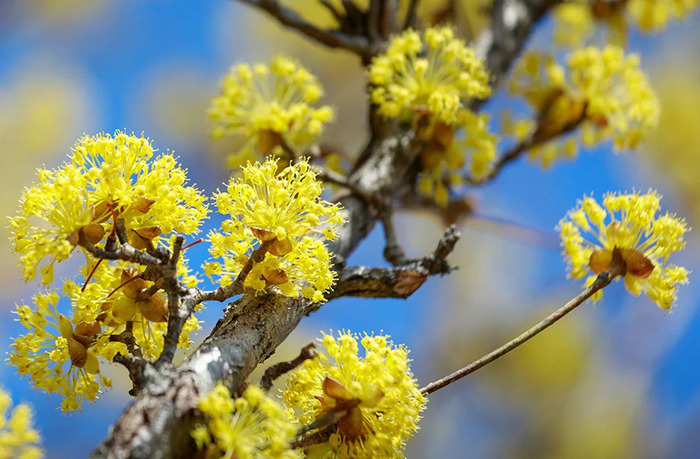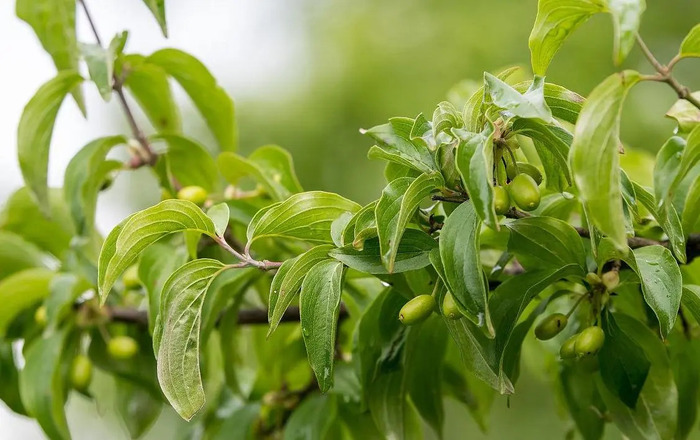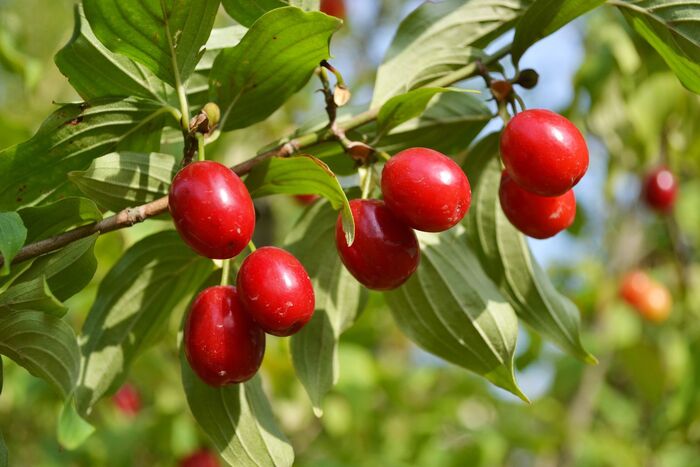Cornus officinalis, commonly known as Japanese Dogwood or Mountain Dogwood, is a deciduous shrub or small tree native to East Asia. It has long been used in traditional medicine for its remarkable healing properties. The mature fruit of this plant is particularly valued in Chinese medicine, where it is known by various names, including Shan Zhu Yu, Shaan Zhi, or Mountain Cornel. With its range of health benefits, from boosting kidney and liver function to promoting overall vitality, Cornus officinalis is a key herbal ingredient in many traditional formulas.

Cornus officinalis grows as a small to medium-sized deciduous tree, reaching heights between 4 and 7 meters. The tree’s bark is light brown and peels off in thin layers, while the branches range from green when young to dark brown as they mature. The leaves are arranged opposite each other and are elliptical or lance-shaped, typically 5–12 cm in length and 3–4.5 cm wide. These leaves have a slightly hairy surface with yellowish-brown hairs on the underside.
In spring, Cornus officinalis produces small, yellow flowers in umbel-like clusters. These flowers bloom before the leaves appear. The fruit, a drupe, is red or purple when ripe and is typically harvested in the fall. The seed inside is oval with a smooth surface.

Cornus officinalis is native to East Asia, particularly in regions of China, Japan, and Korea. It thrives in temperate climates and prefers moist, well-drained soil. It is typically found in forested areas or on the edges of mountains, where it enjoys partial shade. The plant is known for its resilience and can survive in less-than-ideal conditions, making it a valuable addition to both natural landscapes and cultivated orchards.
Ideal growing conditions for Cornus officinalis include:
Soil: Loamy, well-drained, and slightly acidic
Climate: Temperate or subtropical climates with moderate rainfall (800mm or more annually)
Sunlight: Prefers partial to full sunlight but can tolerate some shade
Watering: Requires regular watering, particularly during the growing season
Cornus officinalis has a rich history in traditional herbal medicine, especially in Chinese medicine. Its fruit, often referred to as Shan Zhu Yu, is used to treat a variety of health issues, particularly those related to kidney and liver function. Below are some of the primary health benefits of this herb:
Kidney and Liver Health
Cornus officinalis is known for its ability to strengthen the kidney and liver, two vital organs in traditional medicine that govern energy and vitality. It is often used to address symptoms of kidney deficiency such as dizziness, tinnitus (ringing in the ears), and lower back pain.
Anti-Aging Properties
Rich in antioxidants, the fruit of Cornus officinalis helps combat oxidative stress, which is linked to premature aging and chronic diseases. The herb's antioxidant activity helps protect cells from damage caused by free radicals, slowing the aging process.
Immune System Boost
This plant has been found to enhance the immune system, helping the body fight off infections and diseases. It supports the body's natural defenses by boosting energy levels and improving overall vitality.
Anti-Inflammatory and Antioxidant Effects
Studies have shown that Cornus officinalis possesses strong anti-inflammatory and antioxidant effects, which can reduce inflammation in the body and prevent chronic inflammatory diseases.
Digestive Health
Cornus officinalis can help regulate the digestive system by promoting better digestion and absorption of nutrients. It is commonly used to treat digestive disorders, including diarrhea and indigestion.
Reproductive Health
In traditional Chinese medicine, Cornus officinalis is often used as a tonic for both men and women to enhance reproductive health. It is known for improving fertility and sexual function.

The medicinal properties of Cornus officinalis can be attributed to its rich chemical composition. Key bioactive compounds found in this plant include:
Morroniside: A compound that has shown potential in regulating blood sugar and protecting against oxidative damage.
Loganin: Known for its neuroprotective and anti-inflammatory properties.
Cornus Tannin: A type of tannin that has antioxidant, anti-inflammatory, and anti-cancer effects.
Sweroside: A flavonoid glycoside with antioxidant and anti-inflammatory activity.
These compounds contribute to the plant's broad range of health benefits, from supporting organ function to combating age-related diseases.
In traditional medicine, Cornus officinalis is often used in its dried form, typically as part of herbal formulas. The fruit is harvested in the fall and dried for use in various treatments. Some common uses include:
Powdered Form: The dried fruit is ground into powder and taken in small doses for tonic purposes.
Herbal Teas: Cornus officinalis is sometimes brewed into tea, either alone or as part of a blend, to promote kidney and liver health.
Tinctures: Alcoholic extracts of the fruit are used to make tinctures, which can be added to water or herbal teas.
For most therapeutic purposes, Cornus officinalis is combined with other herbs in traditional formulas. Some well-known formulas that include Cornus officinalis are:
Shen Qi Wan: A formula used to enhance kidney and urinary function.
Six Flavor Tea (Liu Wei Di Huang Wan): A tonic for kidney and liver health.
Zuo Gui Wan: A formula for toning the kidneys and improving sexual function.

Cornus officinalis can be cultivated in both wild and farm settings. Cultivation requires attention to soil quality, water supply, and sunlight. The tree begins to bear fruit after 4-6 years of growth, with full production typically reached around 15 years. The fruit is harvested in late autumn, typically after it has ripened and turned red or purple. The harvesting process is labor-intensive, as the fruit must be carefully collected and dried to preserve its medicinal properties.
Cornus officinalis is a versatile and powerful plant with numerous health benefits. From its role in traditional medicine to its bioactive compounds that promote longevity and well-being, this herbal remedy continues to be relevant in modern-day health practices. Whether used to strengthen kidney and liver function, improve immunity, or reduce inflammation, Cornus officinalis is a natural health powerhouse that has stood the test of time.
As research continues, we are likely to uncover even more benefits of this remarkable plant, ensuring its place in both traditional and modern medicine for years to come.
What is the best way to consume Cornus officinalis?
The fruit can be consumed in powdered form, as an herbal tea, or as part of a tincture. It is often used in combination with other herbs in traditional Chinese formulas.
What are the side effects of Cornus officinalis?
Generally, Cornus officinalis is considered safe when used in appropriate amounts. However, it may not be suitable for individuals with certain conditions, such as excessive internal heat or a tendency toward constipation.
Can Cornus officinalis be used to treat kidney disease?
Yes, Cornus officinalis is commonly used in traditional medicine to support kidney health, particularly in treating conditions related to kidney deficiency.
This guide offers a detailed look at the benefits, cultivation, and usage of Cornus officinalis, making it an essential resource for anyone interested in herbal medicine or natural wellness.
animal tags: Cornus
We created this article in conjunction with AI technology, then made sure it was fact-checked and edited by a Animals Top editor.